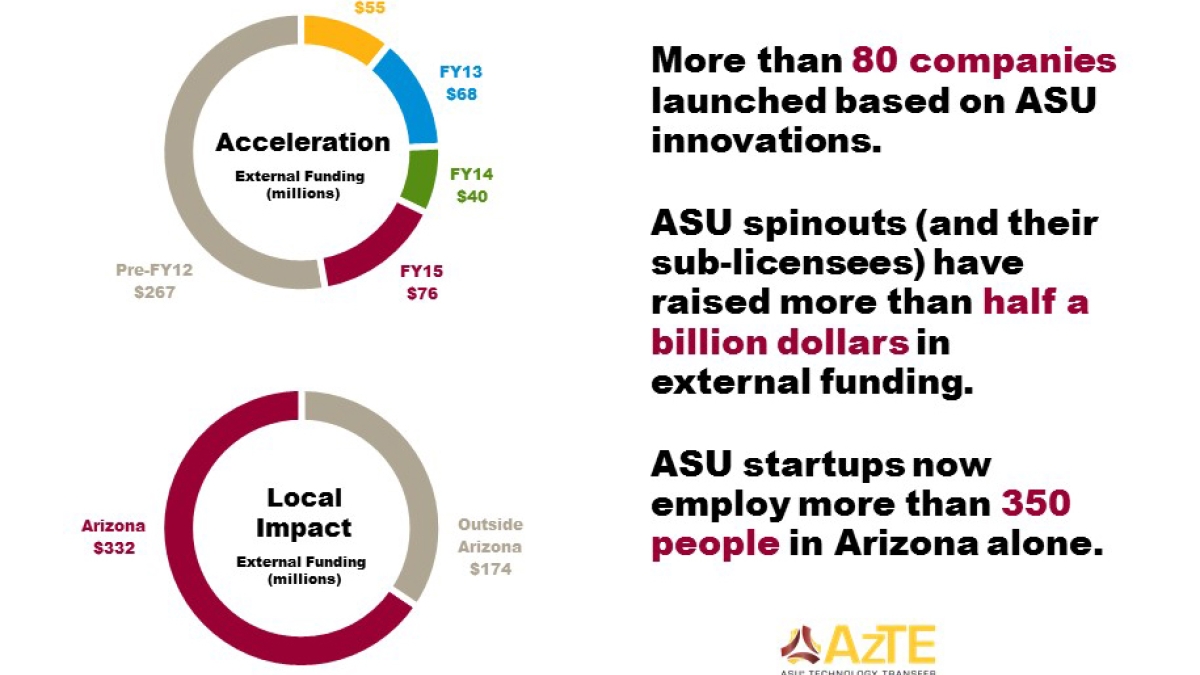Like the mythical bird it is named after, Phoenix is undergoing a rebirth, and Arizona State University is a key player in the economic redevelopment of the region.
ASU brings major strengths in innovation and research to the table: More than 80 companies have launched based on ASU innovations, and ASU spinouts and their sub-licensees have generated more than half a billion dollars in external funding.
Contributions like those are crucial to economic revial efforts, such as the recently launched Velocity initiative.
Velocity envisions the region achieving a higher level of economic competitiveness by becoming less focused on consumption industries and more focused on advanced fields, such as science and tech – which bring with them higher-paying jobs and an elevated city profile.
Enhancing the region’s entrepreneurship culture is crucial to those efforts.
ASU startups employ more than 350 people in Arizona alone. And a new report ranks ASU among the top 50 international universities for the number of patents issued to its researchers in 2014.
“We aren’t new to the (entrepreneurship) game; we’ve been doing that,” Charlie Lewis, vice president of venture development at Arizona Technology Enterprises. “We’re just trying to accelerate it.”
Lewis says this approach is part of ASU President Michael M. Crow’s New American University model.
“The university plays a role that goes well beyond educating students; there’s a role we play in the community in a development standpoint,” Lewis said. “It’s a partnership with the community, with innovators, with entrepreneurs.”
The university’s innovative climate was a key part of what drew Jamie Tyler to join its faculty.
At ASU, he developed the idea that would later launch Thync, a wearable device that uses neurosignaling algorithms to optimize the wearer’s state of mind for energy and calm.
“ASU gave me a blank slate to do that,” said Tyler, associate professor in the School of Biological and Health Systems Engineering, and co-founder and chief science officer at Thync. “They didn’t really care what I worked on, as long as I was productive.
“I really credit that to President Crow – it was obvious from when I arrived. It was kind of the Wild West of science and technology development. They couldn’t give you a free run forever, but they were willing to support a lot of out-of-the-box thinkers.”
Tyler sees a big opportunity for the Phoenix region to develop as a hub of technology and innovation, pointing to its history in those fields with companies such as GE and Motorola.
“There’s a lot of potential there, and ASU just fuels that,” he said. “They just provide a pipeline for talented individuals.”
One way in which the university is connecting to talented individuals in the community is through its new Startup Mill, which will provide Arizona-based entrepreneurs with the same acceleration services available to ASU students, faculty and post-doctoral researchers.
The regional Velocity plan, for which Crow serves as a committee member, is also focused on increasing workforce development in schools, from primary to post-secondary. ASU’s Ira A. Fulton Schools of Engineering was specifically named as a part of that plan, developing it into a world-class teaching and research institution known for its expertise.
The Fulton Schools can play a very important role in the revitalization of Phoenix's economy, said Yong-Hang Zhang, associate dean for research at Fulton.
“The Fulton engineering school is positioned very well, not just with classroom learning, but also – we create a lot of new knowledge. So that’s why we can create a lot of new startups,” he said. “And because they commercialize our inventions, during that commercialization process students get additional education beyond the classroom. … We put it in real practice.”
Education and innovation are linked, said Tyler, who points out that most of the students he interacts with want to work for a startup.
“The real reason why you innovate is to try to educate,” he said. “At the core that’s what it’s all about.”
More Business and entrepreneurship

With help from ASU and a viral TikTok, an entrepreneur soars
Nearly five years ago, Ruben Trujillo saw his entrepreneurial dream slipping away as he wondered how he would pay his rent.Now,…

Honoring 2 decades of entrepreneurial impact on a global scale
Thunderbird for Good, the impact-driven initiative of Thunderbird School of Global Management at Arizona State University, is…

ASU and GoDaddy launch Student Athlete Venture Studio
In a groundbreaking initiative aimed at empowering college athletes beyond their playing careers, Arizona State University and…


